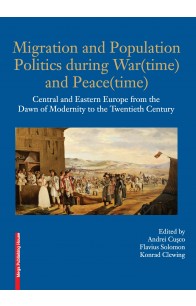Rezultate căutare pentru 'Andrei Tudor Moldovan'
SUMMARY
Carmen Borbély & Petronia Popa Petrar, Foreword
I. Configurations of Posthumanist Thought
Horea Poenar, (Another) Year Zero: The Commons in a Posthuman Age
Rareș Moldovan, Authentes: a Shadow-Play or A Series of Observations in “Post” about Authenticity
Călina Părău, Thinking and Constructing Moments of Split
Attila Kovács, Anonymity and Spectral Existence in Urban Space
Marius Conkan, Mapping Literature: Geocritical Thinking and Posthumanism
Marie-Agnès Cathiard, De l’« imaginaïf » en prosthétique
Cosmina Moroșan, Peace and Technology. Michel Serres
II. Figurations of Posthuman Becoming
Christian Moraru, Crossing the Kafka Network: Schulz, Blecher, Foer, and the Repositioning of the Human
Giovanni Rotiroti, Subjectivations et désubjectivations post-humaines. Corps de langage et flux inconscients dans le matérialisme enchanté d’Urmuz et Gherasim Luca à partir de la pensée de Gilles Deleuze et Félix Guattari
Doru Pop, Replicant Theologies of the Early Robocene or The Covenant of Procreating Replicants, Cybernetic Fertility and Divine Androids
Alina Preda, “New Planets for Old”: A Posthumanist Ecocritical Approach to Jeanette Winterson’s Ustopia
Ruxandra Cesereanu, Lanark and Unthank – Posthuman Elements in Alasdair Gray’s Novel
Diana Melnic, Vlad Melnic, Shortcut to Posthumanism: Decentring Elements of the Gaming Experience
Kwasu D. Tembo, Among Them but Not One of Them: A Xenological Exploration of the Otherness and Power of DC Comics’ Superman
Nóra Máthé, “Are You Thor, the God of Hammers?” – Mixing the Posthuman and Old Norse Mythology in Thor: Ragnarok
Nicolae Andrei Szilagyi, The Human in the Context of a Posthuman World
Cristina Diamant, Archiva(b)l(e) Bodies and Cyber Afterlife in David Mitchell’s Cloud Atlas
Marius Viorel Pușcaș, From Narrative Art to Discourse. A Posthuman Approach in Firmin: Adventures of a Metropolitan Lowlife
III. Refiguring Past Trauma, Prefiguring an Apocalyptic Future
Corin Braga, Antiutopies apocalyptiques et posthumaines
Andrada Danilescu, Beyond the Human: Transhumanist Negotiations and Posthuman Instantiations in Aldoux Huxley’s Brave New World and David Mitchell’s Cloud Atlas
Dana Bizuleanu, Svetlana Alexievich and Posthuman Narratives
Anamaria Lupan, Marguerite Yourcenar et le post-humanisme
Dana Percec, The Canadian Tempest. Margaret Atwood and Shakespeare Retold as Hag-Seed
Aura Poenar, Necessary Monsters. Monstrous Narratives. Haunted Images of Our Time
Book Reviews
"This volume with the somewhat ambitious title Migration and Population Politics during War(time) and Peace(time): Central and Eastern Europe from the Dawn of Modernity to the Twentieth Century reflects and builds upon the current debates in the thriving field of migration studies and migration history. It aims to provide an innovative perspective on the regional East European dimension of this phenomenon by discussing the specific migration processes in the area from early modern times to the present."(Excerpt from "Introduction")
Universul intelectual românesc al secolului XX a fost constant dinamizat de „slujitorii” muzei Clio. Momente determinante din existenţa României moderne au găsit în această sferă a cunoaşterii o voce indispensabilă articulării discursului politic. Realizarea şi consolidarea României întregite în 1918, dar şi forţele ce au declanşat comunizarea ţării după cel de‑al Doilea Război Mondial i-au implicat pe unii istorici fie prin forme ale angajamentului politic, fie prin prisma preocupărilor ştiinţifice.
Lucrarea intitulată „Andrei Oţetea: un spirit al Sorbonei în România secolului XX” tratează parcursul unui istoric transilvănean format în mediul universitar francez al primului deceniu interbelic. Efervescenţa ce caracteriza ştiinţa trecutului în anii petrecuţi ca student la Paris, profesorii care îl îndrumă şi, mai ales, dorinţele sale de a se ridica la exigenţele Universităţii Sorbona îi marchează reperele intelectuale. Statutul de titular al unei catedre universitare de istorie îi facilitează conexiunile instituţionale, manifestând un interes constant pentru a face cunoscute în ţară curente şi orientări noi ce plecau din prestigiosul centru ştiinţific. Regimul comunist produce însă ruptura. Timp de mai bine de un deceniu, lui Oţetea nu i se permite să revină în Franţa. Abia contextul creat de destinderea politică îl readuce la Paris, de care rămâne legat până la sfârşitul vieţii, fie prin poziţii oficiale, fie prin amiciţii intelectuale. (din „Introducere”)
Indicele poate fi accesat descărcând fragmentul atașat.






